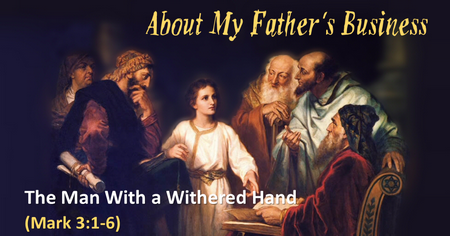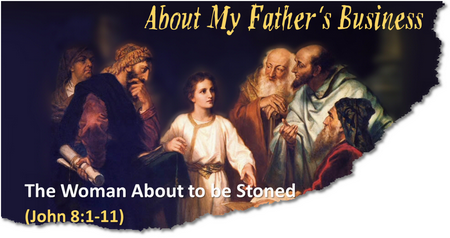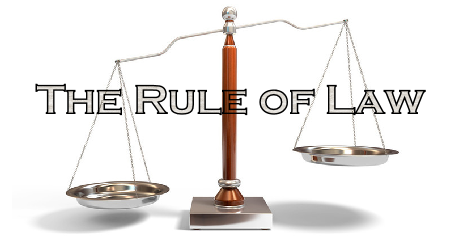Category: Law
Subject: Law
Mining the Scriptures: 1 Timothy 1:8-11

Paul did not have a dislike for the law of Moses. Though his reputation was often attacked, Paul realized the main purpose of that Law. It is “to bring us to Christ” (cf. Galatians 3:24). It was good. But, it had to be used correctly. It had to be obeyed. The law of Moses is not where redemption is found, it was given to prepare and lead to redemption.
The law is abused by the disobedient. He includes in this passage a sampling of that. He references the unholy and profane. Individuals like murderers, fornicators, sodomites, kidnappers, liars, perjurers. These are not exclusive, they are representative of all types of sin.
But, the law is contrasted with what Paul refers to as “the glorious gospel of the blessed God which was committed to my trust” (11). The abuse of the law does teach an important truth, such sins are “contrary to sound doctrine, according to the glorious gospel” as well, and worthy of judgment, (cf. Romans 1:28-32). The law also is not the end all. The glorious gospel of God, committed to Paul, is.
Paul’s Letter to the Galatians

Paul always had a purpose in his writing. When writing to the churches in the province of Galatia, he sought to correct some errors they had been led to, by men who opposed Paul just about everywhere he went.
These men were Judaizers, desiring to bind the covenant of circumcision and adherence to the law upon the Gentiles. They opposed what Paul taught, and sought to both contradict him, and delegitimize him in the eyes of others.
So, Paul began by defending his apostleship. He was not a usurper, but had been chosen by Jesus Himself (cf. Acts 9). What he taught had been accepted by the church in Jerusalem, and sanctioned by God (cf. Acts 15:1-35).
Moses and Jesus – Servant and Son

“Therefore, holy brethren, partakers of the heavenly calling, consider the Apostle and High Priest of our confession, Christ Jesus, 2 who was faithful to Him who appointed Him, as Moses also was faithful in all His house. 3 For this One has been counted worthy of more glory than Moses, inasmuch as He who built the house has more honor than the house. 4 For every house is built by someone, but He who built all things is God. 5 And Moses indeed was faithful in all His house as a servant, for a testimony of those things which would be spoken afterward, 6 but Christ as a Son over His own house, whose house we are if we hold fast the confidence and the rejoicing of the hope firm to the end” (Hebrews 3:1-6).
The book of Hebrews seeks to contrast all that surrounds Christ and His covenant with what came before. In every comparison made, Christ, and all that surrounds His life, ministry, death, covenant and body is better. It is fuller, more powerful, more important, more effective, more sublime.
The reason for this comparison was that Jews who had accepted Jesus as their Christ and Lord were reluctant to move on from the Law of Moses. This was unfortunate, and something that put their standing with God in jeopardy. This the writer made clear: “For on the one hand there is an annulling of the former commandment because of its weakness and unprofitableness, 19 for the law made nothing perfect; on the other hand, there is the bring in of a better hope, through which we draw near to God” (Hebrews 7:18-19).
One of the obvious comparisons would be between Moses and Jesus. Moses was the lawgiver. He would be considered by the Jews as the most important messenger from God. He was given the responsibility of shepherding Israel out of Egyptian bondage, leading them through the wilderness for a generation, and ushering them to the borders of Canaan. In all ways Moses was “faithful in His house” (Hebrews 3:2). Whose house? Not his own. Moses was a servant in the house of God.
The distinction is easy to see. “He who built the house has more honor than the house” (3). There is a great deal of difference between the Master of the house, its owner — and the servant. Jesus Christ is “a Son over His own house” (6) in contrast to the position of faithful servant attributed to Moses.
- Moses was a prophet, Jesus is the Son. “God, who at various ways spoke in time past to the fathers by the prophets, 2 has in these last days spoken to us by His Son” (1:1-2).
- Moses’ covenant was ushered in on the blood of animals, Jesus’ on His own blood. “For it is not possible that the blood of bulls and goats could take away sins” (10:4). “Therefore Jesus also, that He might sanctify the people with His own blood, suffered outside the gate” (13:12).
- No justification was to be found under Moses’ law, it comes through faith in Christ. “Therefore by the deeds of the law no flesh will be justified in His sight, for by the law is the knowledge of sin. 21 But now the righteousness of God apart from the law is revealed, being witnessed by the Law and the Prophets, 22 even the righteousness of God, through faith in Jesus Christ, to all and on all who believe…” (Romans 3:20-22).
- The intent of Moses’ law was to precede “those things which would be spoken afterward” (3:5), but Christ’s law is that which was spoken last (1:2). “But before faith came, we were kept under guard by the law, kept for the faith which would afterward be revealed. 24 Therefore the law was our tutor to bring us to Christ, that we might be justified by faith. 25 But after faith has come, we are no longer under a tutor” (Galatians 3:23-25).
- The Law of Moses ushered in an inferior priesthood to Christ, who is our High Priest after the order of Melchizedek. “But Christ came as High Priest of the good things to come, with the greater and more perfect tabernacle not made with hands, that is, not of this creation. 12 Not with the blood of goats and calves, but with His own blood He entered the Most Holy Place once for all, having obtained eternal redemption. 13 For if the blood of bulls and goats and the ashes of a heifer, sprinkling the unclean, sanctifies for the purifying of the flesh, 14 how much more shall the blood of Christ, who through the eternal Spirit offered Himself without spot to God, cleanse your conscience from dead works to serve the living God?” (Hebrews 9:11-14).
It is disheartening that even in our time religious people do not understand the significance of this contrast. There is a desire to make the appeal to the Law of Moses for authority and standing, not knowing that it abrogates our justification by faith in Christ Jesus. “You have become estranged from Christ, you who attempt to be justified by law; you have fallen from grace.” (Galatians 5:4). There is a difference between Moses and Jesus—The servant and the SON!
Mining the Scriptures: 1 Timothy 1:5-7

In the fourth verse, Paul noted that “fables and endless genealogies” bring disputes and strife. They are to be avoided. In contrast, the intention of God’s commandments are to promote love. The two great commandments are to love God and love your neighbor. God has established this as a primary principle. All that is required from Him leads to these two things. A love for God and for man characterizes the true Christian. So, a keeping of the laws of God leads to love, not strife.
In order to attain the objective of love, out text indicates that our hearts must be pure. The word pure indicates a heart that is clean, free from corruption. This is especially true with regard to motivation. Also needed is a good conscience. In effect, a man who consistently does what he thinks is right, and avoids doing what he thinks is wrong. Finally, it requires a sincere faith. Faith that is genuine. These are the prerequisites of God’s law bringing about love.
Without these we are ineffective, lacking in understanding.
The Patternists: To Whom and to What Should We Appeal?
In his letter to the Colossians, Paul expressed the purpose of his ministry and our work as Christians, given by God. “To them God willed to make known what are the riches of the glory of this mystery among the Gentiles: which is Christ in you, the hope of glory. Him we preach, warning every man and teaching every man in all wisdom, that we may present every man perfect in Christ Jesus. To this end I also labor, striving according to His working which works in me mightily” (1:27-29). Paul taught men the doctrine of Christ, and established disciples (learners) of Him. It enabled Paul — and enables us as well — to present to the Lord mature, capable saints.
If we denigrate, alter, or substitute for the gospel of our Lord, what will we become? For those who chafe at the idea of adhering to the pattern of the New Covenant of our Lord, what do you offer? Paul addressed that question in chapters two and three in his letter to the Colossians.
Continue reading “The Patternists: To Whom and to What Should We Appeal?” →
Sermon: The Man with a Withered Hand

19th in a series on the life and ministry of Jesus Christ. This text of Mark 3:1-6 examines Jesus’ healing of a man with a withered hand in the face of the ungodly opposition of the Pharisees. Hard hearts and deceitful plotting did not keep the Lord from doing what was lawful and good.
Sermon: The Woman About to be Stoned

This lesson discusses an example of Jesus’ masterful dealing’s with man. We see His ability to deftly handle the efforts of His enemies to destroy His reputation, to convict the hearts of men, and His great compassion and love for the souls of men.
“Abolished in His flesh the enmity”

The apostle Paul acknowledged the hostility that existed between Jew and Gentile in the first century. He also acknowledged that such enmity was a result of the Law of Moses. This Law placed a barrier between the Jew (the chosen people of God), and the rest of humanity.
That Law was special, even necessary to prepare the world for the Messiah of God. In Galatians 3:24, Paul wrote, “Therefore the law was our tutor to bring us to Christ, that we might be justified by faith.” The Law of Moses was wonderful, but never intended by God to be the means of mankind’s redemption. The promise that God made to Abraham that He would make of his descendants a great nation, was accompanied by the promise that “…in you all the families of the earth shall be blessed” (Genesis 12:3).
This promise was realized when that Law of Moses ceased its authority over men (cf. Romans 7:1-6). When Jesus paid the price for the sins of all mankind, Paul wrote that He, “abolished in His flesh the enmity, that is, the law of commandments contained in ordinances, so as to create in Himself one new man from the two, thus making peace, and that He might reconcile them both to God in one body through the cross, thereby putting to death the enmity” (Ephesians 2:15-16).
We do not mourn the loss of Moses’ law. Instead, we rejoice that it served its purpose, to “bring us to Christ, that we might be justified by faith.” Now, we state with joy, “But after faith has come, we are no longer under a tutor” (Galatians 3:25). “For through Him we both [Jew and Gentile] have access by one Spirit to the Father” (Ephesians 2:18).
To see The Patternists Page on Facebook, click here, and Like!
The Rule of Law

The phrase, “rule of law” is bandied about in political discussions in our time. It is an interesting phrase, and an understanding of it has some interesting spiritual implications:
Sermon: “Open my eyes, that I may see…”

In Psalm 119:18, the writer prays to God for discernment regarding the wonderful things contained in His law. Such discernment (the opening of our eyes) is needed, and worthy of our petitions to God.
The Patternists: You Who Desire to be Under the Law

Some who claim to be disciples of Jesus will seek to justify their doctrinal positions by an appeal to the Old Testament. For example, why do people advocate tithing, or Sabbath keeping, or the use of instruments to accompany the hymns they sing in congregational worship? The only appeal that can be made is to the Old Law. “David did it!”
In Galatians 4:21, Paul wrote, “Tell me, you who desire to be under the law, do you not hear the law?” His point was that the law spoke of its own end, and that the children of promise would be free through faith in Christ Jesus. As Paul concluded, “So then, brethren, we are not children of the bondwoman but of the free” (Galatians 4:31). By extension, one can’t argue from the Law to justify his practice as a Christian.
Consider these truths as examples:
- Christians don’t tithe, they give as prospered (cf. 1 Corinthians 16:1-2)
- Christians don’t keep the Sabbath, they worship on the first day of the week (Sunday) (cf. Acts 20:7)
- Christians don’t worship with instruments, they sing songs (Ephesians 5:19; Colossians 3:16)
The warning is severe: “You have become estranged from Christ, you who attempt to be justified by law; you have follen from grace” (Galatians 5:4).
To see The Patternists Page on Facebook, click here, and Like!
Sermon: The Law of Moses

The Lesson discusses weaknesses inherent in the Law of Moses. (Not mistakes made by God, but limitations of the law, by design). Also, the Purpose the Law of Moses serves in the redemption of man.
The Patternists: The Rule of Law

In the midst of all the rhetoric heard concerning immigration, protest and racial tension that is troubling our country, the voice of scripture is seldom heard. Consider these words from the pen of the apostle Peter:
“Therefore submit yourselves to every ordinance of man for the Lord’s sake, whether to the king as supreme, or to governors, as to those who are sent by him for the punishment of evildoers and for the praise of those who do good” (1 Peter 2:13-14).
Obviously, the worldly disregard scripture. They could care less what God has to say regarding citizenship. However, the true Christian is constrained by the Holy Spirit. Scripture tells us that we are to obey the laws of the land, “for the Lord’s sake.” Those who disregard the rule of law do so to their soul’s detriment.
Yes, there is a limit to the obedience we proffer to our government (cf. Acts 5:29). But that threshold is far above the lawlessness that has gained the acceptance and even approval of a large segment of our nation. Both the laws of God and of man must be respected. God said so!
To see The Patternists Page on Facebook, click here, and Like!
Cultural Newspeak

In George Orwell’s classic novel 1984 , the government sought to limit freedoms, and influence thought, by introducing a variation of English called “Newspeak.” The idea was for the government to establish words with specific meanings, and to eliminate words that contained thoughts that were possibly antagonistic to the government’s purposes.
I find it interesting in our day that something similar is occurring. Definitions of words are being changed as a means of promoting new ideas and values while at the same time discouraging values that society no longer considers acceptable. Since those unacceptable values are often held by Christians, those who hold their faith dear are being marginalized by society. Let me supply a few examples:
FB: Shadow and Substance

In scripture there are a number of type/antitypes found that accurately show the superiority of Christ and His covenant with man. An example is found in Colossians 2:16-17, “So let no one judge you in food or in drink, or regarding a festival or a new moon or sabbaths, which are a shadow of things to come, but the substance is of Christ.”
The law (vs. 14) and the things that surrounded it are referred to as a “shadow of things to come.” That is another way of describing “type.” Paul wrote, “but the substance is of Christ.” That is equivalent to “antitype.”
So, Paul’s comparison of shadow and substance rightly describes the type/antitype relationship. Type is to antitype as shadow is to substance.
With that in mind, we place our faith in Jesus Christ. It is in Him that the substantive fulfillment of God’s scheme of redemption for man can be found!
Click below to…





